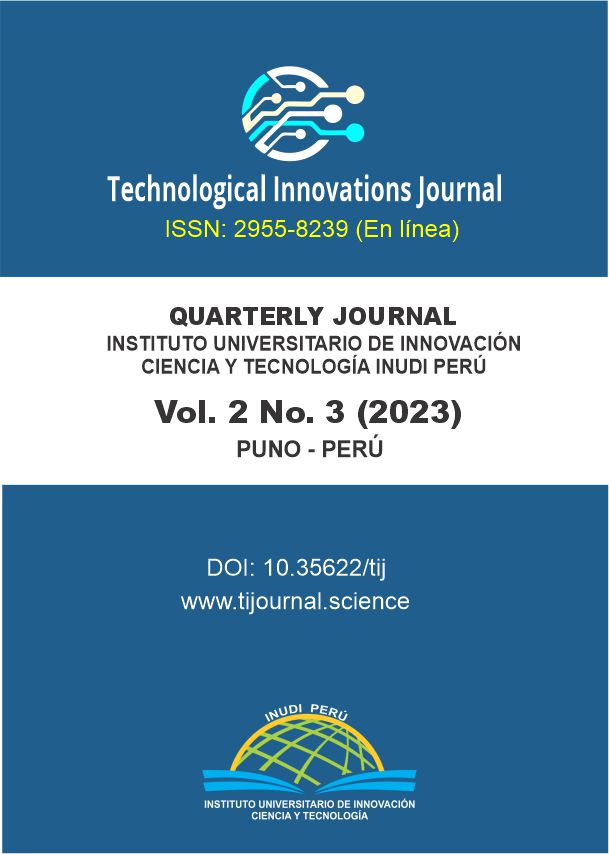Analysis of the teacher training of a higher education institution
DOI:
https://doi.org/10.35622/j.ti.2023.03.002Keywords:
teacher training, COVID-19, digital resources, MoodleAbstract
eacher training in higher education institutions to face the challenges in times of the COVID-19 pandemic and after it, has highlighted the importance of teachers acquiring the digital skills necessary to guarantee the continuity of learning. It is for this reason that this investigation has the following objectives: to analyze the profile of the teacher training courses for the years 2020, 2021 and 2022 that were received by the professors of the Technological Institute of Durango who participated in at least one course, as well as to carry out a content analysis of the name of the courses using word clouds. The study is qualitative, non-experimental, cross-sectional, descriptive and documentary analysis was used as a data collection technique. The results showed that in 2020 teacher training focused more on the use of the Moodle platform at basic and intermediate levels to enable the configuration of virtual classrooms, in addition to the use of digital tools that served to provide the foundations for continuity. educational. In 2021 Moodle is still a training need, but now more focused on the advanced use of the platform.
References
Almaraz, M. F., Maz, M. A., & López, E. C. (2016). Análisis de la transformación digital de las Instituciones de Educación Superior. Un marco de referencia teórico. EDMETIC, 6(1). https://doi.org/10.21071/edmetic.v6i1.5814 DOI: https://doi.org/10.21071/edmetic.v6i1.5814
ANUIES. (2022). Estado actual de las tecnologías educativas en las instituciones de educación superior en México. Asociación Nacional de Universidades e Instituciones de Educación Superior. https://cutt.ly/MwsKNF8L
Areniz-Arevalo, Y., Barrientos-Avendaño, E., Coronel-Rojas, L., Cuesta-Quintero, F., Bayona-Ibañez, E., & Rico-Bautista, D. (2020). Plataforma Moodle como apoyo a la presencialidad: Experiencia de uso en la Universidad Francisco de Paula Santander Ocaña en tiempo de Covid-19. Revista de la Asociación Interacción Persona Ordenador (AIPO), 1(2).
Arias, J., & Covinos, M. (2021). Diseño y metodología de la investigación. En Enfoques Consulting EIRL.
Arias, O. E., Eusebio, J., Pérez, A. M., Vásquez, M., & Zoido, P. (2019). Del papel a la nube: Cómo guiar la transformación digital de los Sistemas de Información y Gestión Educativa (SIGED). https://doi.org/10.18235/0001749
Cabero-Almenara, J., Gallego-Pérez, O., Puentes, P. Á. de J., & Jiménez, R. T. (2018). La “Aceptación de la Tecnología de la Formación Virtual” y su relación con la capacitación docente en formación virtual. EDMETIC, 7(1), 225–241. https://doi.org/10.21071/edmetic.v7i1.10028 DOI: https://doi.org/10.21071/edmetic.v7i1.10028
Crespo-Antepara, D. (2021). Enseñanza remota emergente. Polo del conocimiento, 6(6).
Cruz, P. M. del C. (2020). Formación continua del docente como factor de la calidad educativa universitaria. Revista Científica Internacional, 3(1). https://doi.org/10.46734/revcientifica.v3i1.21 DOI: https://doi.org/10.46734/revcientifica.v3i1.21
Díaz, H. J. A., Sánchez, S. M. J., Aguilera, R. M. E., Loyola, P. K. E., Ramírez, C. J. A., & Reynosa, N. E. (2020). Capacitación docente y calidad educativa en tiempos de Covid-19. Revista Científica Cultura, Comunicación y Desarrollo, 5(3), 84–89. https://rccd.ucf.edu.cu/index.php/aes/article/view/263
Díaz, R. E. M., Díaz, V. J. M., Sánchez, M. Y., Gorgoso, V. A. E., Riverón, R. G., & Tenrero, S. N. (2022). Plataforma Moodle y la aplicación WhatsApp, recursos didácticos en tiempos de COVID-19. Revista de Investigación en Tecnologías de la Información, 11(23), 1–14. https://doi.org/10.36825/RITI.11.23.001 DOI: https://doi.org/10.36825/RITI.11.23.001
Fernández de Juan, T. (2009). Formación Pedagógica Docente y Desempeño Académico de Alumnos en la Facultad de Ciencias Administrativas de la UABC. Revista de la Educación Superior, 38(2).
Flores, V. L., Gomez, Y., Chacaltana, R., Prado, P., Jurado, E., & Huayta, F. Y. (2021). Desafíos en la formación continua docente: Una revisión sistemática. Revista Científica Pakamuros, 9(4). https://doi.org/10.37787/pakamuros-unj.v9i4.237 DOI: https://doi.org/10.37787/pakamuros-unj.v9i4.237
García, A. P., & García, A. J. L. (2022). Necesidades de capacitación docente en herramientas e-learning durante la pandemia COVID-19. Dilemas contemporáneos: Educación, Política y Valores. https://doi.org/10.46377/dilemas.v9i3.3220
García-Peñalvo, F. J., & Corell, A. (2020). La CoVId-19: ¿enzima de la transformación digital de la docencia o reflejo de una crisis metodológica y competencial en la educación superior? Campus Virtuales, 9(2).
González, F. M. O. (2021). La capacitación docente para una educación remota de emergencia por la pandemia de la COVID-19. Revista Tecnología, Ciencia y Educación, 81–102. https://doi.org/10.51302/tce.2021.614 DOI: https://doi.org/10.51302/tce.2021.614
Heimerl, F., Lohmann, S., Lange, S., & Ertl, T. (2014). Word cloud explorer: Text analytics based on word clouds. Proceedings of the Annual Hawaii International Conference on System Sciences. https://doi.org/10.1109/HICSS.2014.231 DOI: https://doi.org/10.1109/HICSS.2014.231
Hernández, D., Aroche, A., & Fernández, R. (2022). Consideraciones teóricas sobre la capacitación docente en el contexto internacional y nacional. ROCA, 18(2). https://dialnet.unirioja.es/servlet/articulo?codigo=8436913
ITD. (2023). Sistema de Gestión Integral. Instituto Tecnológico de Durango. https://www.itdurango.edu.mx/sgi/
Rodríguez-Rivas, J. G., Rodríguez, Z. M. A., & Saucedo, R. A. R. (2020). Cisco Networking Academy entornos virtuales de aprendizaje en educación superior. Tecnologías de la Información en Educación: Sistematización de experiencias docentes, 78–90. https://cutt.ly/HwsKNm6Y
Ruiz, B. C. (2021). Enfoque tecno-pedagógico post COVID-19 una propuesta para las instituciones de Educación Superior de América Latina. Investigación y postgrado, 36, 9–23. https://dialnet.unirioja.es/servlet/articulo?codigo=8483607
Sánchez, G. M., Miró, A. M. L., Ruiz, R. F. J., & Cebrián de la Serna, M. (2021). Evaluación de programas online de capacitación docente sobre innovación y competencias digitales durante la Covid-19: #webinarsUNIA. RIED. Revista Iberoamericana de Educación a Distancia, 25(1). https://doi.org/10.5944/ried.25.1.30763 DOI: https://doi.org/10.5944/ried.25.1.30763
Valverde-Berrocoso, J., & Balladares Burgos, J. (2017). Enfoque sociológico del uso del b-learning en la educación digital del docente universitario. Sophía, 23. https://doi.org/10.17163/soph.n23.2017.04 DOI: https://doi.org/10.17163/soph.n23.2017.04
Zhindón-Calle, K. M., & Ávila-Mediavilla, C. M. (2021). Tecnologías emergentes aplicadas a la práctica educativa en pandemia COVID-19. Revista Arbitrada Interdisciplinaria Koinonía, 6(3), 32. https://doi.org/10.35381/r.k.v6i3.1303 DOI: https://doi.org/10.35381/r.k.v6i3.1303
Published
Issue
Section
License
Copyright (c) 2024 José Rodríguez-Rivas (Autor/a)

This work is licensed under a Creative Commons Attribution 4.0 International License.











